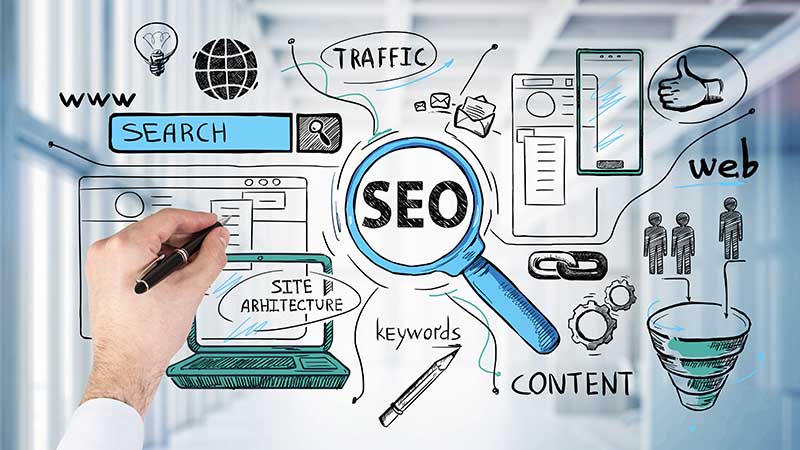September 27, 2020
The Benefits of Using Dedicated Servers for Business Websites

When companies think about digital marketing, initiatives like paid ads and email campaigns usually get most of the attention. But the cornerstone of a great digital marketing strategy is your business’s website. Your website is often the first touchpoint people have with your brand. Whether they’re reading a blog, looking at your products, or simply researching your company, customers always come back to your website.
That emphasis has made web design a priority for many businesses, but what about the back end? How is your WordPress, Joomla, or Drupal site hosted? Details like server type are more likely to take a backseat, even though a dedicated server is a crucial element of your website, and of earning the trust and high regard of customers.
Why Do Servers Matter?
A server can refer to the software or hardware that runs your website and responds to requests from the web, such as a customer requesting to view your website (clicking into your home page) from a search engine.
Servers are important because they determine the availability and load speed of your business’s website. If your server goes down, so does your website (unless you’ve built in redundancy), and you lose out on visitors and customers. Even if your server is reliable, the bandwidth and speed of your server determines how quickly users can access your site. If your server is slow, your website will be slow as well, taking longer to load pages, images, and videos.
As simple as page load looks from the user’s end, the server actually has to juggle multiple complex tasks to complete the process. It has to:
- Run thousands of lines of code
- Process multiple queries – sometimes hundreds – to retrieve the correct content
- Deliver multiple file types in multiple languages to the browser
A server needs a lot of processing power and memory capacity for all of this to happen. It needs even more to power the process at a speed that users – and search engines like Google – will find acceptable.
Shared vs Dedicated Servers
Every website has to be on a server to connect to the internet, but you can choose between a shared or dedicated server.
Shared servers host multiple websites, or pieces of content, handling the transfer of information to and from all of those websites simultaneously. If your company prefers to use shared hosting plans, you’ll typically work with a third party hosting provider that sells space on the server to multiple businesses.
Dedicated servers host only one website per server, although businesses that purchase a dedicated server can choose to put multiple websites on a single dedicated server. For example, if you own two different businesses, you could purchase a dedicated server and place two websites, one for each of your businesses, on the server. The server is still dedicated only to your needs, but it’s now a private server that’s running multiple websites.
The more content (websites) a server has to handle, the more overwhelmed it can become. Hosting services can set up more server computers to handle the extra volume, but shared servers can still run into data storage limits and, more importantly, speed issues.
Because they power multiple websites, shared servers have many demands on their resources. At peak times when many people are viewing the websites on the server, the server may not be able to deliver data fast enough to load even simple pages quickly, let alone multimedia and eCommerce sites. Users get frustrated and navigate to other sites, taking potential revenue with them. If website load speed is slow when Google crawls your website, it will also hurt your SEO, since load speed is a significant factor in organic ranking.
The Benefits of Using Dedicated Servers for Web Hosting
A dedicated server only hosts one website, so all of its storage capabilities and processing speed serve that one site. The information pathways aren’t crowded, so site information gets to the browser much faster. That means a better user experience and, more importantly, improved SEO so more users can find and visit your site.
Faster Page Loading
Research shows that 40 percent of shoppers will leave a site that takes more than three seconds to fully load. Even a one-second delay has negative effects, including:
- 11 percent fewer page views
- 7 percent fewer conversions
- A 16 percent drop in customer satisfaction
Most importantly, page load times have a major impact on SEO.
Faster Load Speed, Better Ranking
Google began incentivizing page load speed in 2010, recognizing the fact that users didn’t want to wait long periods of time for sites to load. In 2018, the search engine giant increased the weight of load speed in page ranking.
Now page one results load in 1.19 seconds, while page two results load in 1.29 seconds. The difference often comes down to the quality of the site’s hosting and whether or not the site owner has invested in a dedicated server.
Depending on their capacity, shared servers may or may not be able to provide the speed a site needs to be highly ranked. It’s more likely that a dedicated server processing data for only one website will be able to load information faster and process quicker transactions. As load time improves, your business’s website will be more likely to be ranked highly, helping you increase web traffic while providing a better user experience that increases customer satisfaction.
Control Over Storage
A server is the home for the data that powers a website. Shared servers are configured to meet the storage needs of their many clients. A dedicated server provides more flexibility, so you can tailor storage and processing power to meet your business’s needs.
The ability to balance storage and power often means faster access to your data, which translates directly to a better user experience. That’s especially important when a company is growing because more customers usually means more demand on a website’s resources. With a shared server, customers could experience slower page loads just when the user experience needs to be at its best.
A Unique IP Address
Every server connects to the internet with its own internet protocol (IP) address. The IP address does two things:
1. Identifies its web interface as unique from all others on the web.
2. Indicates the location of the site’s physical home base.
A shared server has multiple websites all operating from the same identified interface. Unfortunately, when a webmaster operates a site unethically, Google blacklists the IP address associated. If one webmaster on a shared server starts spamming or buying backlinks, every website on that server could end up with black marks on their records.
With a dedicated server, a website’s identity is its own. It won’t be blamed or penalized for someone else’s actions and will keep running smoothly as long as it’s run well.
Better Overall Security
Cybersecurity is a major concern for business websites, and dedicated servers are by nature safer than shared servers. A shared server is vulnerable to any errors that any of the other hosted sites might contribute. If one webmaster makes an error, the whole server could crash and other hosted sites could lose thousands in income.
A dedicated server only runs a single set of scripts, so there’s much less potential for interference. Additionally, the unique IP address that comes with a dedicated server provides better protection against attacks, which in 2019 alone cost companies $2 trillion. And that doesn’t account for the customers who may have avoided certain sites after high-profile attacks.
More Options for Customization
A dedicated server gives you more control over the design and structure of your site. This is essential for a growing business that may need to increase its bandwidth or add a new program quickly and without interruption.
Dedicated servers let webmasters script in any language and run any software they need. It also lets companies customize their CPU, RAM, and disk space as needed. With a shared server, that level of customization isn’t possible, as every business may have different requirements. In most cases, shared servers have preloaded configurations, applications, and software that customers must work with.
Customer Service
The level of customer service you receive will vary greatly depending on the hosting provider you select. However, many businesses receive better customer service from hosting solutions that emphasize dedicated servers. Hosting solutions that provide dedicated servers often deal with smaller numbers of clients and may provide more resources (including more servers) to ensure clients are satisfied with their services.
Regardless of the type of server you choose, you should evaluate customer support options before making a final decision. Ask providers how you can reach them (phone, email, chat?) and read online reviews to see how existing clients rate their support options.
Who Should Consider Dedicated Servers?
Dedicated servers can have a significant affect on your company and it’s performance. In general, all companies should consider dedicated servers as an option, especially if they’ve experienced load speed problems that have caused traffic to decline or have heard complaints about user experience from their customers.
You can consider dedicated servers if you:
- Need to improve site ranking, web traffic, and customer experience
- Manage a B2B website or an e-commerce website that has experienced uptime or customer support problems from your existing web host
- Have an e-commerce business that is launching a new, dedicated website apart from featuring products on sites like Shopify and Amazon
- Want more personalized server plans and improved web security
WordPress Hosting Solutions
Like other content management systems, web hosting services for WordPress can use either shared servers or dedicated servers. Some companies also offer managed WordPress hosting, which alleviates the burden on your IT and marketing teams. Managed WordPress hosting on a dedicated server typically means your hosting provider will help you handle security issues, site backups, and WordPress updates as well as ensuring your server and website are functioning at optimal levels.
Securing a Dedicated Server
A dedicated server is an investment that can benefit your business in multiple ways. Your website should be among your first considerations since it attracts and educates customers on your business and its products. But dedicated servers can benefit other areas of your business as well.
Finance is one example. Business finances are sensitive, and with information on your customers, it needs to be secure. A dedicated server for QuickBooks hosting or other financial tools such as Sage may be something to consider as you evaluate dedicated servers for your website as well.
Once you’ve decided to make the switch to a dedicated server for your business website or other operational departments, you need to be prepared to make the switch. Deciding to use dedicated servers means agreeing to higher costs to provide customers with a better experience or improve cybersecurity for your business. When you pay for dedicated server technology, you get the bandwidth and disk space to move data along at the speed of business.
At Epic Notion, dedicated servers are an integral part of our website design and digital marketing strategies. We connect clients with hosting services that have high-quality dedicated servers available. These servers become the foundation for fully customized websites that offer better customer experiences. When combined with paid advertisements, email campaigns, and conversion rate optimization that bring more visitors to your website and convert them to customers, your business could see substantial ROI.




